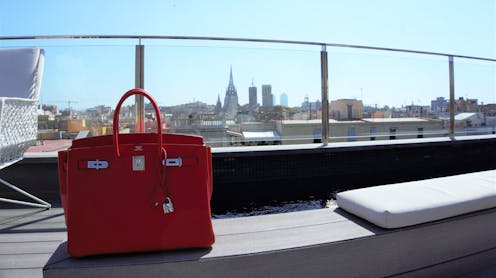
The Birkin bag made by French luxury retailer Hermès has become a status symbol for some of the global elite. Notoriously difficult to obtain, a select few obsess over how to get their hands on one.
But when US retailer Walmart recently launched a much cheaper bag that looked very similar to the Birkin, nicknamed a “Wirkin” by others, it sparked discussions about wealth disparity and the ethics of conspicuous consumption.
In this episode of The Conversation Weekly podcast, we speak to two sociologists about the Birkin and what it symbolises.
For the rich housewives of Delhi, the Birkin bag is a must have, says Parul Bhandari. A sociologist at the University of Cambridge in the UK, she’s spent time interviewing wealthy Indian women about their lives and preoccupations. She told us:
A bag that is carried by rich women of New York, of London, of Paris, is something that you desire as well, so it’s a ticket of entry into the global elite.
Birkins are also used by some of these rich women as a way to show off their husband’s affection, Bhandari says: “ Not only from the point of view of money, because obviously this bag is extremely expensive, but also because it is difficult to procure.” The harder your husband tries to help you get the bag, the more getting one is a testimony of conjugal love.
Manufactured scarcity
Named after the British actress Jane Birkin, Hermès’s signature bag can cost tens of thousands of dollars, or more on the resale market for those made in rare colours or out of rare leathers. But you can’t just walk into any Hermès store to buy one, as Aarushi Bhandari, a sociologist at Davidson College in the US who studies the internet – and is no relation to Parul – explains.
You need to have a record of spending tens of thousands of dollars even before you’re offered to buy one. But spending that money doesn’t automatically mean you get a bag. You have to develop a relationship with a sales associate at a particular Hermès store and the sales associate really gets to decide, if there’s availability, whether or not you get offered a bag.
Bhandari became intrigued by online communities where people discuss the best strategies for obtaining an Hermès. So when US retailer Walmart launched a bag in late 2024 that looked very similar to a Birkin, and the internet went wild, Bhandari was fascinated.
She began to see posts on TikTok discussing the bag. First it was fashion accounts talking it up, but then a backlash began, with some users criticising those who would spend thousands on a real Birkin and praising the “Wirkin” as a way to make an iconic design accessible to regular people. Bhandari sees this as an example of an accelerating form of anti-elitism taking hold within parts of online culture.
In February, the chief executive of Hermès, Axel Dumas, admitted that he was “irritated” by the Walmart bag and that the company took counterfeiting “very seriously”.
The Walmart bag quickly sold out and no more were put on sale. It has since entered into a partnership with a secondhand luxury resale platform called Rebag, meaning customers can buy real Birkins secondhand through Walmart’s online marketplace.
The Conversation approached Hermès for comment on the Walmart bag, and to confirm how the company decides who is eligible to buy a Birkin. Hermès did not respond.
Listen to the full episode of The Conversation Weekly podcast to hear our conversation with Parul Bhandari and Aarushi Bhandari, plus an introduction from Nick Lehr, arts and culture editor at The Conversation in the US.
This episode of The Conversation Weekly was written and produced by Katie Flood. Mixing and sound design by Eloise Stevens and theme music by Neeta Sarl.
TikTok clips in this episode from babydoll2184, chronicallychaotic and pamelawurstvetrini.
Listen to The Conversation Weekly via any of the apps listed above, download it directly via our RSS feed or find out how else to listen here.
Parul Bhandari and Aarushi Bhandari do not work for, consult, own shares in or receive funding from any company or organisation that would benefit from this article, and has disclosed no relevant affiliations beyond their academic appointment.
This article was originally published on The Conversation. Read the original article.







